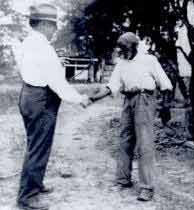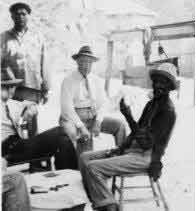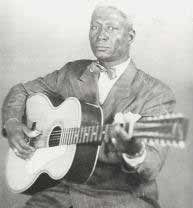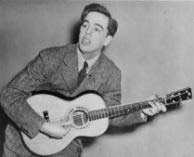VOICE ONE:
Welcome to THIS IS AMERICA in VOA Special English. I'm Shirley Griffith.
VOICE TWO:
And I'm Steve Ember. Lomax is a name well known to historians of American musical culture. Today we have the first of two programs about how the Lomax family helped keep American folk music from being lost.
(MUSIC)
VOICE ONE:

John Avery Lomax was born in 1867. He came from the state of Mississippi but grew up in Texas. His interest in cowboy music led him to research and collect examples of cowboy songs.
In 1910 he published a book called "Cowboy Songs and Other Frontier Ballads." It contained not only the words to songs but some of the music as well. It began with an introduction by President Theodore Roosevelt.
"Cowboy Songs and Other Frontier Ballads" was an important research achievement. And it started John Lomax on his lifelong work.
The book included classics like "Sweet Betsy From Pike," "Git Along, Little Dogies" and "Home on the Range." Gene Autry was a singing cowboy in old films. Here he is singing "Home on the Range."
(MUSIC)
VOICE TWO:
At the time the book was published, John Lomax helped found the Texas Folklore Society. He traveled around the country raising money to establish other folklore groups. He spoke about the importance of preserving folk songs for future generations. In 1919, he published another collection, called "Songs of the Cattle Trail and Cow Camp."
His two sons, John Junior and Alan, traveled with him around the country. In 1932, the MacMillan Publishing Company agreed to help them create a collection of folk songs, especially from black Americans. The Lomaxes went to Washington to examine the Archive of American Folk Song at the Library of Congress.
The library agreed to provide John Lomax with the recording equipment he needed. In exchange, he agreed to travel throughout the United States to make recordings that would become the property of the archive at the library.
VOICE ONE:

In 1934, John Lomax became honorary consultant and curator of the Archive of American Folk Song at the Library of Congress. He held the title until his death in 1948. In all, he collected more than 10,000 recordings. Another Lomax also took an interest: his daughter Bess.
Dan Sheehy is acting head of the Center for Folklife and Cultural Heritage at the Smithsonian Institution.
DAN SHEEHY: "The Lomaxes, John and Alan, the father and son team --and then Bess to a certain extent -- worked at the Library of Congress. And they were part of this very exciting groundbreaking work in the 1910s, 20s, 30s, into the 40s and beyond, of showing the United States what it was, what it had in terms of grassroots cultural heritage.
"And so they would travel to places where certainly white people in the 30s and 40s would not work too much in black communities, because there was so much antagonism between black and white at that time – racism toward African Americans. And Alan Lomax had some very compelling and really engaging stories to tell about actually painting himself up in blackface so that he could go into black communities, so that some of the whites wouldn't single him out and beat him up or whatever.
"In any case, John and Alan Lomax were very dedicated to locating these what they thought of as folk geniuses. They were looking for people who at the same time were representatives of a much bigger powerful tradition in the case of African-American music, but at the same time were really singular in their ability to express that tradition."
VOICE TWO:
The Lomaxes found one of these "folk geniuses" at the state prison in Angola, Louisiana, in 1933. He was a twelve-string guitar player named Huddie Ledbetter--also known as Lead Belly. One of his best known recordings is this one, "The Midnight Special."
(MUSIC)

Lead Belly was released from prison the next year, in 1934. That same year, John Lomax published a book called "American Ballads and Folk Songs." He included many of the songs gathered from prisons in the South.
After that, Lead Belly became a celebrity. He was offered recording contracts, concert performances and radio broadcasts.
VOICE ONE:
Lead Belly worked for the Lomaxes as a driver and assistant. And John Lomax served as his manager, choosing performances and media appearances.
Some music writers say John Lomax paid himself too much out of Lead Belly's income. Dick Weissman is author of the book "Which Side Are You On? An Inside History of the Folk Music Revival in America." He says half of Lead Belly's concert fees went to John Lomax. And when Alan was added, he says, all three shared the money, so Lead Belly got only a third.
But others say music like Lead Belly's would never have become widely known if it wasn't for the work of John Lomax.
(MUSIC: "Good Night, Irene")
VOICE TWO:

Alan Lomax was 18 years old when he started traveling with his father. They worked together in the South. But Alan also collected recordings himself in other parts of the country -- New England, New York and the Midwest.
And he did not stop there. His desire to increase understanding among people took him to other countries as well. He collected folk songs from the Caribbean and Europe, including this "Wedding Serenade" from Italy.
(MUSIC)
VOICE ONE:
Alan Lomax has been called "the father of the American folk song revival." He brought attention to singers like Woody Guthrie and Pete Seeger in the 1930s and 40s.
He also made the first recording of a guitar-playing farm worker named McKinley Morganfield. Millions of blues fans around the world would come to know McKinley Morganfield by another name. Here is Muddy Waters singing "Take a Walk With Me."
(MUSIC)
VOICE TWO:
We will continue our story of the Lomax family next week. You can find transcripts, MP3s and podcasts of all of our programs at voaspecialenglish.com. You can also post a comment. And if you do, here is a question you can answer: Who do you consider a "folk genius?"
VOICE ONE:
Tell us if you have a favorite American blues or folk singer -- young or old -- and what makes that person's music special to you. Go to voaspecialenglish.com, find our program and post your answer.
VOICE TWO:
You can also find a link to John Lomax's first book "Cowboy Songs and Other Frontier Ballads." I'm Steve Ember.
VOICE ONE:
And I'm Shirley Griffith. Our program was written by Nancy Steinbach and produced by Caty Weaver. Join us again next week for THIS IS AMERICA in VOA Special English.
Bess Lomax Hawes, 88, brought folk music to a wider public
From traditional to 'freak,' the evolution in American folk music
New talent takes stage at Texas folk music festival
Johnny Cash: A world famous country music performer
(来源:VOA 编辑:陈丹妮)
